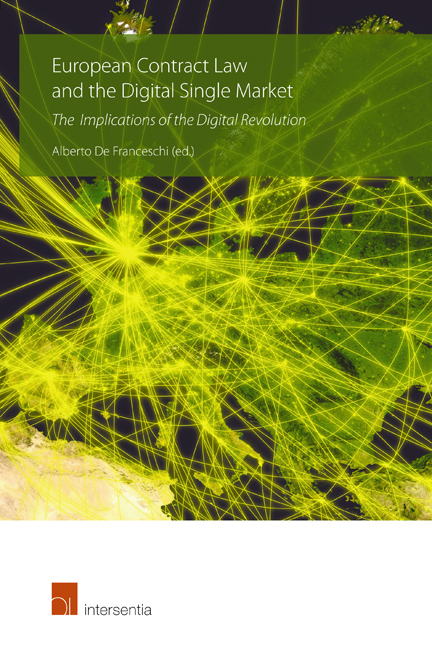Book contents
- Frontmatter
- Preface
- Contents
- List of Authors
- European Contract Law and the Digital Single Market: Current Issues and New Perspectives
- PART I THE IMPACT OF DIGITAL TECHNOLOGY ON PRIVATE LAW RELATIONSHIPS
- PART II DATA AS A TRADEABLE COMMODITY AND THE NEW INSTRUMENTS FOR THEIR PROTECTION
- PART III THE LEGISLATIVE INSTRUMENTS FOR A DIGITAL SINGLE MARKET
- A European Market for Digital Goods
- Supply of Digital Content. A New Challenge for European Contract Law
- Reflections on Remedies for Lack of Conformity in Light of the Proposals of the EU Commission on Supply of Digital Content and Online and Other Distance Sales of Goods
- The Proposal of the EU Commission for a Regulation on Ensuring the Cross-Border Portability of Online Content Services in the Internal Market
- The Law Applicable to Consumer Contracts in the Digital Single Market
- PART IV NEW FEATURES OF STANDARD CONTRACTS IN THE DIGITAL MARKET
- PART V ONLINE PLATFORMS IN THE ‘SHARING ECONOMY’
A European Market for Digital Goods
from PART III - THE LEGISLATIVE INSTRUMENTS FOR A DIGITAL SINGLE MARKET
Published online by Cambridge University Press: 12 December 2017
- Frontmatter
- Preface
- Contents
- List of Authors
- European Contract Law and the Digital Single Market: Current Issues and New Perspectives
- PART I THE IMPACT OF DIGITAL TECHNOLOGY ON PRIVATE LAW RELATIONSHIPS
- PART II DATA AS A TRADEABLE COMMODITY AND THE NEW INSTRUMENTS FOR THEIR PROTECTION
- PART III THE LEGISLATIVE INSTRUMENTS FOR A DIGITAL SINGLE MARKET
- A European Market for Digital Goods
- Supply of Digital Content. A New Challenge for European Contract Law
- Reflections on Remedies for Lack of Conformity in Light of the Proposals of the EU Commission on Supply of Digital Content and Online and Other Distance Sales of Goods
- The Proposal of the EU Commission for a Regulation on Ensuring the Cross-Border Portability of Online Content Services in the Internal Market
- The Law Applicable to Consumer Contracts in the Digital Single Market
- PART IV NEW FEATURES OF STANDARD CONTRACTS IN THE DIGITAL MARKET
- PART V ONLINE PLATFORMS IN THE ‘SHARING ECONOMY’
Summary
This article considers the Commission's proposal of three sets of regulations as it moves towards creating a digital internal market. It discusses the draftRegulation on cross-border data portability (section 2), and the draftDirectives concerning digital content (section 3) and the online trade in goods (section 4), followed by an initial analysis. The article ends with the opinion (section 5) that the Commission has presented a highly welcome proposal for the creation of a digital internal market that, above all with respect to the field of contracts concerning the provision of digital content, is worthy of support from the point of view of commercial law.
DIGITAL GOODS
In his ‘government statement’ Jean-Claude Junker and, following him, Commissioners G. Oettinger and A. Ansip attached top priority to the commercial law structure of the European digital internal market. Accordingly, the Commission has now presented its ideas for the modernisation of copyright within the EU and as a first step has published three proposals for one Regulation and two new Directives aimed at creating a working digital internal market: a Regulation on ensuring the cross-border portability of online content services in the internal market, a Directive intended to regulate contracts for the supply of digital content, and a proposal for a Directive concerning contracts for the online and other distance sales of goods.
Article 2(11) of the Consumer Rights Directive, which concerns distance sales and the conclusion of off-premises contracts, has already defined digital content as follows: ‘Data which are produced and supplied in digital form’. This is explained in further detail in recital 19: ‘Data which are produced and supplied in digital form, such as computer programs, applications, games, music, videos or texts, irrespective of whether they are accessed through downloading or streaming, from a tangible medium or through any other means.’
Article 2(j) of the draftRegulation on a Common European Sales Law contains the following definition: ‘Data which are produced and supplied in digital form, whether or not according to the buyer's specifications, including video, audio, picture or written digital content, digital games, software and digital content which makes it possible to personalise existing hardware or software …’.
- Type
- Chapter
- Information
- European Contract Law and the Digital Single MarketThe Implications of the Digital Revolution, pp. 111 - 126Publisher: IntersentiaPrint publication year: 2016

